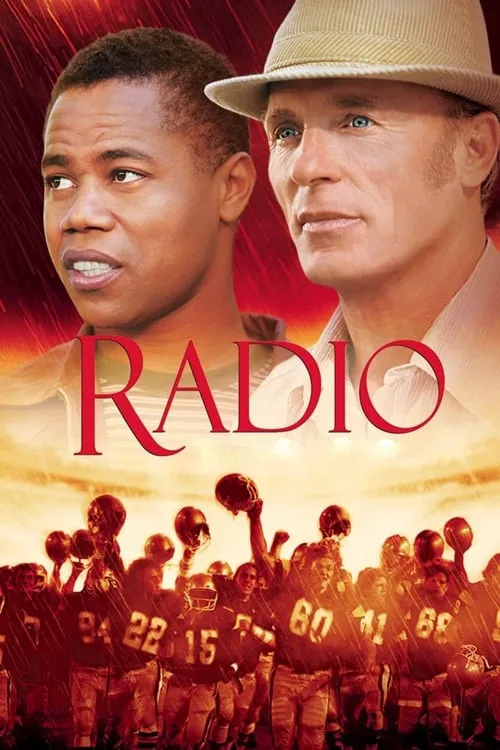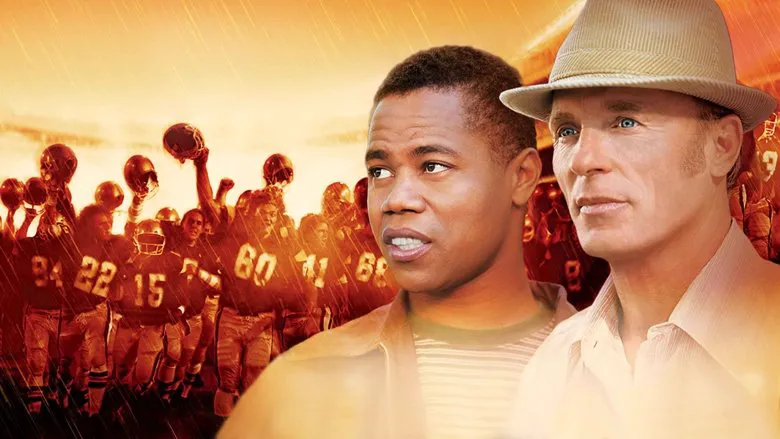Radio

Plot
Radio is a heartwarming drama film released in 2003, directed by Michael Tollin and starring Cuba Gooding Jr., Ed Harris, and Allison Eastwood. Set in the racially divided town of Anderson, South Carolina in 1976, the movie delves into the complexities of human relationships, perseverance, and the unwavering dedication of a coach to his team, despite the obstacles he faces. The story begins with Coach Harold Jones, a principled and passionate football coach at T.L. Hanna High School, who has grown weary of the overemphasis on winning in the world of high school sports. Harold's passion for the game remains steadfast, but his concerns about the treatment of his players are genuine. During the early stages of the new school year, Harold stumbles upon a mentally disabled African-American young man nicknamed Radio, who is an occasional presence around the school's football field. Enchanted by Radio's evident passion for the game, despite his limited abilities, Harold takes the young man under his wing. He introduces Radio to his football team, and it doesn't take long for the youngster to win their hearts over with his relentless enthusiasm. Before long, Radio evolves into a key assistant to Harold's team, motivating the players and instilling a renewed sense of purpose among them. One of the pivotal aspects of the story is Radio's entry into the high school. Harold's persistence helps him secure a place for Radio among the students, leading to him being admitted to the school program. This rare gesture is met with resistance from local community members, who harbor racial prejudices. However, Harold remains steadfast in his dedication to Radio, ignoring prevailing opinions of the townsfolk. However, as the school year unfolds and the football season gains momentum, tensions rise as the team faces stiff competition from rival schools. The mounting pressures force Harold to confront the treacherous hierarchy of sports rivalries in the high school world. Furthermore, local parents as well as fans in the team's support base start to question Harold's coaching strategies. He is strongly criticized for giving preferential treatment to Radio, fearing that the young man's mere presence is influencing the team's performance. Despite the tide of disapproval around him, Harold refuses to compromise on his idealistic stance. Refusing to cut ties with Radio, he becomes increasingly isolated, facing off against the harsh realities of his situation. The opposition proves not merely petty resistance but an assessment of the worth of his coaching; a sign that perhaps he's thinking more about Radio than the top prize of the championship. Harold receives moral support from an elderly local church member, Dottie Phillips, who embodies courage in standing firmly against her fellow community members' judgment regarding their ill-treatment of Radio as well as many other intellectually disabled townspeople. Around her time mentoring Radio at church enables her to show the incredible character within him. In the midst of all the rife opposition, Harold stands firmly committed to his coaching ethics. Ultimately, a crucial moment arises when his team nears the end of the season. During the climax of the championship match, they come across more opposition than the town people against Harold's relationship with Radio. Far from wavering or becoming emotionally overwhelmed under pressure, Harold manages to turn this conflict into a beacon of hope, resolving that he needs more determination for victory; he's set to meet the towns' expectations, all while standing by Radio. But is it possible to meet other people's expectations without even considering the aspirations of someone within his institution? This conundrum provides a complex internal struggle and prompts memorable introspection in Coach Harold, underlining his unyielding bond with Radio. Amid high-stakes pressure, Radio suddenly disappears during an after-game party. Harold's response –– a desperate, arduous search of the townspeople and law enforcement –– conveys just how much Harold and Radio mean to one another. Eventually, Harold comes to a resolution with Radio, one of untold triumph that embodies a victory often times even greater than sports championships: overcoming the odds for profound friendship to transpire in both tangible and soul-stirring terms. Radiant, poignant, and moving, the life story told in the movie will captivate both your heart and imagination.
Reviews
Kiara
What I truly appreciate are these American movies based on true stories, which allow me to witness the beauty of humanity in everyday Americans. This is American values education, far more vivid and touching than China's hollow and grandiose moralizing. It's films like these that are at the heart of American cinema, not the typical Hollywood action and spectacle.
Clara
Simplicity at its finest, delivering a heartfelt touch.
Cooper
This story wouldn't be so moving if it were just a story. What makes this kind of film so powerful is the inclusion of real footage after the narrative. That's when it really gets to you.
Aiden
Hi, good morning! This is Radio... Radio..."
Recommendations





